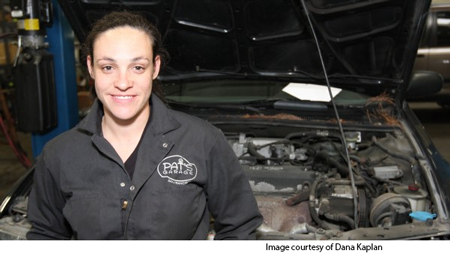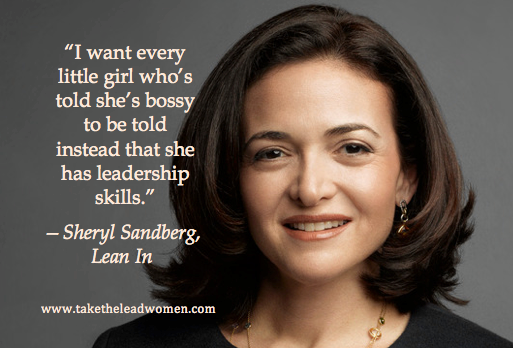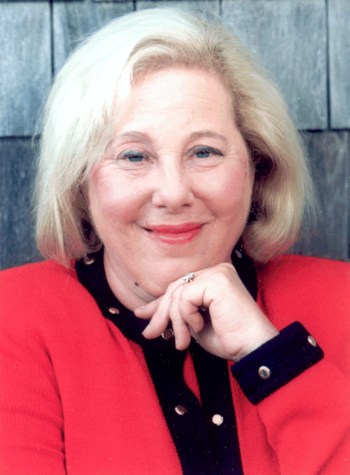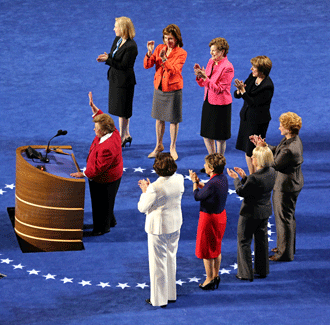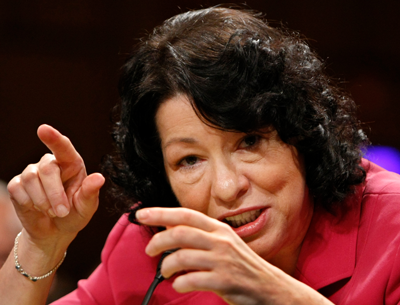Connect with Gloria!
Bring Gloria to Speak
Featured Upcoming Event
Wednesday, Oct. 2-Nov. 13, 2013 Gloria will teach a 6-week online course "9 Practical Leadership Power Tools to Advance Your Career". This is a Take The Lead event in partnership with Arizona State University Online. Participants will receive a certificate to enhance their resumes along with practical skills and understanding of power dynamics in the workplace. Don't miss this opportunity and register today!
More events here.
Buy Gloria’s Latest Book
-
-
-
Accolades

"With heartfelt encouragement ... (including strategies for including men in feminist causes), this guide is accessible to all."
~Publisher's Weekly
 "Female Writers Kicking Up Literary Dust"
"Female Writers Kicking Up Literary Dust"
~Women's e-News"Top 30 Political Mom Bloggers"
~The Stir"Gift Ideas for the Change Agents on Your List"
~Claire Mysko"Feminist Reading List"
~Deep Muck Big Rake"5 Must-Read Books for Women"
~Hello LadiesRead additional Media Buzz here.
-
Recent Posts
Recent Comments
- Gloria Feldt; An Inspiring Woman » CreativeBizHub on She’s Doing It: LisaBeth Weber Pins Pack Message Wallop
- Gloria Feldt on Stuck? Meet Jake and the Power of Letting Go to Move Forward
- Leslie on Stuck? Meet Jake and the Power of Letting Go to Move Forward
- Liz @ Creative Liberty on Sandberg: Are You Bossy or Merely Showing Leadership Skills?
- Gloria Feldt on Sandberg: Are You Bossy or Merely Showing Leadership Skills?
Categories
Listen to My Podcasts

Stacey Gualandi of The Women's Eye interviewed me about--what else--women and power.
Shelley Irwin of NPR asks me why I believe that no one is holding women back but themselves.
Suzanne Braun Levine and I discuss No Excuses on The Fiesty Side of Fifty on Blog Talk Radio.
Nicole Sanders talks to me about No Excuses on her show Radio or Not, on Progressive Talk Radio.
Dennis Lambert of KJZZ's "Morning Edition asks me why I wrote No Excuses.
Talking to Terry Hernon MacDonald about No Excuses over at Single Women Rule.
Discussing No Excuses with Joe Conason on Book Talk Radio.
Talking with Amanda Marcotte on RH Reality Check about women and power.
See Jane Do interview, encouraging women to step into positions of power and leadership – now!
Speaking with MadamaAmbi about No Excuses
Women's Relationship to Power and Leadership
Tag Archives: women and leadershipStuck? Meet Jake and the Power of Letting Go to Move ForwardI’m just back from a great vacation in Croatia, Petra, and Israel. Seeing so many beautiful and historic places, I vacated my mind, let go of worries
Posted in Inspiration, Leadership, Power, Power Tools, Webinar
Tagged 9 Ways power tools, empowerment, leadership, letting go, Take The Lead, vacation, webinar, women and leadership, women and power
2 Comments
Dana Kaplan: How Community College Helped Her Change Careers
If at first you don’t succeed, try, try again. Like a lot of recent graduates, Kaplan had trouble getting work in her chosen field — philosophy — after college. She realized she needed a change when she found herself stuck “9 to 5 in a cubicle. I couldn’t stand it.”Or, if you’re an auto mechanic and 2011–12 AAUW Career Development Grantee Dana Kaplan, try something completely different! I asked Kaplan how she made the jump from one career to the next. “I always knew I wanted to work with my hands,” she said. For a while she considered going into construction, to which people generally responded, “You’re too smart; you’re too pretty [for a job like that].”
Posted in Inspiration, Leadership, No Excuses, Power, She's Doing It, Workplace
Tagged leadership, No Excuses, power-to, women, women and leadership, women and power
Comments Off on Dana Kaplan: How Community College Helped Her Change Careers
Sandberg: Are You Bossy or Merely Showing Leadership Skills?
It has sparked an interesting and somewhat contentious conversation
Posted in 9 Ways Blog, Gender, Leadership, Workplace
Tagged facebook, leadership, leadership skills, Lean In, LeanIn.org, Sheryl Sandberg, women and leadership
5 Comments
She’s Done It: Betty Friedan, Sheryl Sandberg, and You
Let’s not waste our time denigrating Betty Friedan’s The Feminine Mystique because it focused only on the problems of affluent women, rather, let us praise her for starting a revolution. Women’s History Month: The Many Takes of Women in the Entertainment IndustryMaking a box-office success movie or TV series without a woman in a sexualized or type-cast bimbo role has historically been hard to impossible. (Read “Leadership Fictions:Gender, Leadership, and the Media”, Take The Lead’s special report on how media influences women’s perceptions of themselves as leaders and others’ ideas about them for some shocking statistics.) That’s why women today who create media by producing, writing, and directing are of the utmost importance to creating the future of our choice. Some women in leading roles on and off screen—like Tina Fey, Amy Poehler, Lena Dunham, and Shonda Rhimes—use their writing to make women the protagonists of their stories. Their takes on what those roles mean to women and feminism, however, are quite diverse.
Posted in Employ Every Medium, Gender, Leadership, Power, Power Tools
Tagged leadership, women, women and leadership, women and power, women's history, Women's History Month
Comments Off on Women’s History Month: The Many Takes of Women in the Entertainment Industry
Women’s History Month: How Rosabeth Moss Kanter Led the Way for Women in the WorkforceI remember how excited I was to discover Rosabeth Moss Kanter in the early 1980’s. She was one of the few females writing about leadership and organizational change management. I hungrily devoured The Change Masters as a relatively new nonprofit CEO navigating roiling changes in the healthcare and political landscape while learning to lead a complex organization toward continued growth. This distinguished Harvard Business School professor’s influential theories about change in the workforce have permeated much of the thinking about organizational change. And unlike the men writing and teaching about it, Kanter infused her work with a lens on one of the biggest workplace changes of the 20th century: women breaking through workplace glass ceilings. Kanter, former editor of Harvard Business Review and author of 18 books, has been named one of the “50 most powerful women in the world” by the Times of London, and the “50 most influential business thinkers in the world” by Accenture and Thinkers 50 research. Her groundbreaking book Men and Women of the Corporation—I mean, who had ever mentioned “women” and “corporations” in the same book title?—remains a classic analysis of power distribution within organizations. Kanter told the hard truth about women in the workforce, after conducting a five-year study on the American manufacturing company. She explained how women were tokenized to work in clerical jobs rather than management; and how even though there were plenty of women in large organizations, they rarely ran the show. She observed that the first women breaking through to leadership roles were still tokens in a male dominated workforce.
Posted in Define Your Own Terms, Know Your History, Leadership, Power, Power Tools, She's Doing It
Tagged leadership, power-to, women, women and leadership, women and power, women's history, Women's History Month
Comments Off on Women’s History Month: How Rosabeth Moss Kanter Led the Way for Women in the Workforce
Women’s History Month: New Hampshire’s Barrier Breaking Political LeadersToday’s U.S. Congress is made up of less than 20% of female members—18% to be exact—a far cry from the parity we strive toward. Any conversation about Women’s History Month must include the rather dismal representation of women in American politics across the board. The Congressional delegation from New Hampshire are the exception to that 20% barrier. Last November, two women won Congressional seats, joining the two women who already held New Hampshire’s two Senate seats. To top it all off, the state’s governor, speaker of the State House, and chief justice of the State Supreme Court are all women as well. These women have made history by making New Hampshire the first state with an all-female Congressional delegation. The senators include Jeanne Shaheen (D) and Kelly Ayotte (R). The new Representatives are Carol Shea-Porter (D) and Ann McLand Kuster (D). Let’s not forget about Gov. Maggie Hassan (D), the only female Democratic governor in 2013, state speaker Terie Norelli (D) and State Chief Justice Linda Stewart Dalianis. While this should be celebrated as a historic win for women and women’s rights, the beliefs of these women are diverse, to say the least. On one hand, there’s Carol Shea-Porter, who stands with EMILY’s List and the National Women’s Political Caucus, among other feminist organizations. And then there’s Kelly Ayotte,
Posted in Create a Movement, Gender, Leadership, Politics, Power, Power Tools, She's Doing It
Tagged leadership, No Excuses, women, women and leadership, women and power, women in politics, women's history, Women's History Month
Comments Off on Women’s History Month: New Hampshire’s Barrier Breaking Political Leaders
Join The Conversation: Is It Time To Lean In To Feminism?
Join this Cross Generational discussion about where Feminism is and where it’s going.
 Our Panelists include YOU and: Gloria Feldt– Past President of Planned Parenthood and Author of No Excuses: 9 Ways WOMEN Can Change How We Think About POWER Emily Bennington – Author of Who Says It’s a Man’s World? Eva Swanson – Student and Women’s Advocate at the College of William & Mary Dana Theus – Founder, InPower Women (Moderator)
Posted in Define Your Own Terms, Leadership, Power, Power Tools, Workplace
Tagged 9 Ways power tools, leadership, No Excuses, power-to, She's Doing It, women and leadership, women and power, women's history, Women's History Month
Comments Off on Join The Conversation: Is It Time To Lean In To Feminism?
Justice Sonia Sotomayor: The “Wise Latina” Makes History IntentionallyThis Women’s History Month, I want to pay special attention to women leaders who are making history today. U.S. Supreme Court Justice Sonia Sotomayor is one woman who is not only making history; she is consciously and deliberately doing so—and telling the story. In January, Justice Sotomayor released her memoir, “My Beloved World,” which provided an honest look at the life of an American leader. While her role in the government is often sanitized, and many people have no idea what the life of a Supreme Court justice is like, Sotomayor reminds her readers that she, too, is a human being. Sotomayor comes from humble beginnings. As a young girl from the Bronx, she had to administer her own insulin injections. Both of her parents emigrated to the United States from Puerto Rico, and she lost her father at nine years old. At Princeton, she advocated for Latinos by setting up an action group for Puerto Ricans on campus and by lobbying for Latino professors to join the Ivy League’s ranks. Even though her job requires her to remain dispassionate about her work, Sotomayor comes off a bit more emotionally in-tune than her colleagues. As the third woman and first Hispanic to join the Supreme Court, her individuality in the courtroom sets a positive example. Understanding her own significance allows her to advocate for the progress of other women and other Latinas who need someone of high authority to be in the public scope, to be visible—to be a role model who can inspire others to achieve as she has done.
Posted in Inspiration, Leadership, Power, Power Tools, She's Doing It, Tell Your Story
Tagged 9 Ways power tools, leadership, No Excuses, power, women and leadership, women and power, women's history, Women's History Month
Comments Off on Justice Sonia Sotomayor: The “Wise Latina” Makes History Intentionally
Smart Women Take the Lead
Maybe you’re going on maternity leave or returning to work after a few years? Or perhaps you want to talk to your boss about flexible working, or you want to get on the fast-track for a leadership position? SWTTL is a live monthly webcast and community for women who want to get ahead. Our aim is to help accelerate effective change for women in the workplace by addressing key issues and creating real breakthroughs! And our two organizations are modeling the kind of collaboration we think women individually and women’s organizations collectively must if we are to move the dial of leadership parity forward for women.
Posted in Leadership, Power, Workplace
Tagged 9 Ways power tools, leadership, No Excuses, power, women and leadership, women and power, women's history, Women's History Month
Comments Off on Smart Women Take the Lead
|

